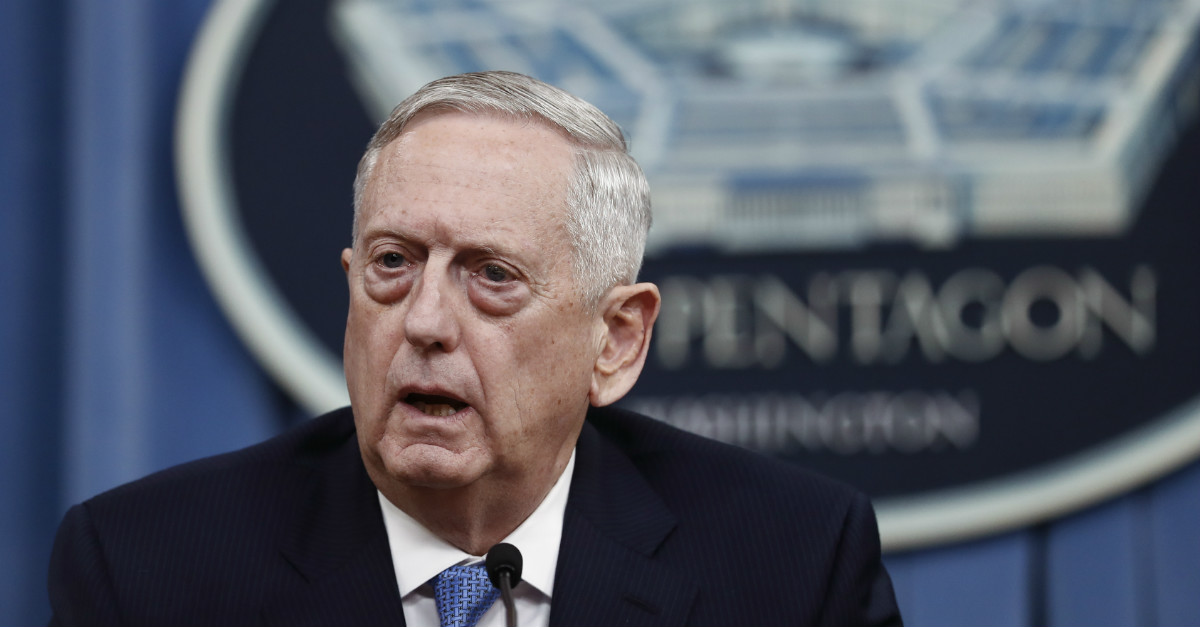Think about the inner workings of the Trump administration and it’s difficult not to picture the brawl scene from “Blazing Saddles,” with the president’s staffers hurling food at each other and throwing punches, while Rex Tillerson emerges from the bathroom, sees the chaos, and quickly ducks back inside. The constant mixed messages from Trump’s cabinet secretaries, compounded by the scrumptious palace intrigue between Jared Kushner and Steve Bannon, suggest a White House that can’t sing in tune.
Videos by Rare
Out of this fray has emerged James “Mad Dog” Mattis, the president’s defense secretary and iconic military leader, to set an unwavering line over the recent attacks on Sharyat airbase in Syria. Is this an escalation, a provocation against the Russians? Mattis’ position couldn’t be clearer. “Our priority remains the defeat of ISIS,” he says, which is “a clear and present danger.” As for Sharyat, “The purpose of this attack was singularly against chemical weapons use.” “The reason for the strike was that alone,” he says. “It was not a harbinger of some change in our military campaign.”
If Mattis is singing a chary alto, Ambassador Nikki Haley, fresh off her steely confrontation with the Russians at the United Nations last week, is belting out a baritone. “Regime change is something that we think is going to happen,” she asserted on CNN. “There is no political solution that any of us can see with Assad at the lead. That’s something that the entire international community has decided.”
RELATED: Don’t be fooled: The Syria strike was an act of war
Mind you, Haley isn’t necessarily advocating further war against the Syrian regime, with hopes still entrenched that Rex Tillerson can diplomatically extract an Assad ousting from Moscow this week. But it’s still a far cry from Mattis’ rhetoric, which tethers the missile strikes directly to Syria’s chemical weapons use and whose underlying message isn’t “get out” but rather “don’t do it again.” On Syria, Haley has emerged as far more hawkish than Mattis.
That took me back to a scene from the Obama administration circa 2013 as reported by Jeffrey Goldberg. Government principals were debating whether to take action against the Syrian regime. That ridiculous fop John Kerry was off on a vengeful soliloquy worthy of MacDuff, pronouncing that the United States should expeditiously bomb Syrian airfields and lacerate Assad. He was interrupted by a ticked-off General Martin Dempsey, then the chairman of the Joint Chiefs, who informed Kerry that the United States couldn’t simply wave its hand and explode Syrian bases. It would require hundreds of sorties to take out Assad’s air defenses, he said, and benighted State Department meddling in military affairs was very much unappreciated.
That chasm, cautious Defense Department versus napalm-in-the-morning State Department, cut its way through the Obama administration, and it appears now to be opening across the Trump administration, too. The military is far less gung-ho than it was under George W. Bush. They’ve lost too many of their own in the arcane Sunni-Shia wars and have seen too many missions inflate to the point of breaking. A Military Times poll from late last year found that 55 percent of active-duty troops opposed further nation-building efforts in the Middle East. They want to focus on protecting the homeland: understandably so.
RELATED: With Syria, Rex Tillerson has his opportunity to shine
State Department diplomats, on the other hand, tend to lack the appreciation for military planning that weighs on their defense counterparts. Many of them, like the former ambassador Robert Ford, were also emotionally invested in Syria, where they’d lived, known friends, watched familiar locales barrel-bombed into plaster. Today it’s Haley, the former South Carolina governor and foreign policy freshman, who’s standing in for the diplomats, while the secretary of state Rex Tillerson is far more enigmatic on the question of Syria (if anything he concurs with Mattis).
It’s Tillerson who will ultimately author the next chapter of this policy, as he haggles with Moscow this week. But don’t dismiss Mattis’ caution. He has the trust of the president, which may be why Trump sounds increasingly determined to limit the mission in Syria, too. Mattis is also something of an Iran hawk—that he’s now going relatively easy on Tehran’s ally Assad should say something about the risks of the Syrian storm.



